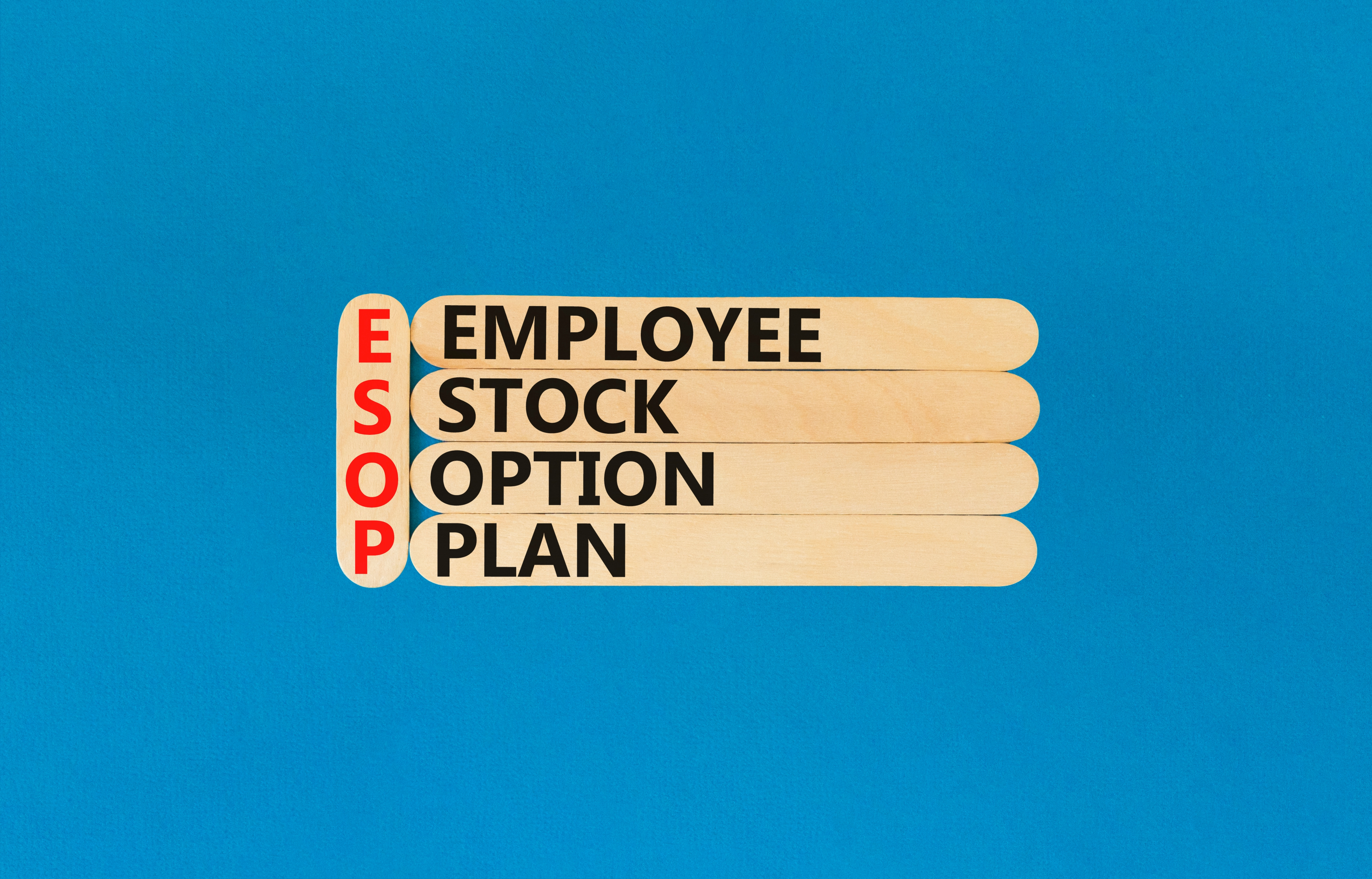What is an ESOP (Employee Stock Option Plan)?
An Employee Stock Option Plan (ESOP) is a structured employee ownership scheme that gives team members the right to buy company shares at a future date, usually at a pre-decided (discounted) price. Instead of receiving shares immediately, employees are first granted “options,” which they can convert into equity after meeting certain conditions — such as completing a vesting period or achieving performance goals.
Simply put, an ESOP is a right, not an obligation, for an employee to become a shareholder in the company. Once vested, the employee can exercise the option and purchase shares at the fixed exercise price, even if the company’s valuation has increased.
For Indian startups and private companies, ESOPs are a strategic way to reward, retain, and motivate key talent, allowing employees to share in the long-term value they help create — without the company needing to make large cash payouts.
How does an ESOP work in Indian private companies?
An ESOP in Indian private companies works through a structured legal and financial process designed to give employees partial ownership over time — without immediately transferring shares. The process is governed by Section 62(1)(b) of the Companies Act, 2013 and the Companies (Share Capital and Debentures) Rules, 2014.
In simple terms, the company grants stock options, employees earn the right to those options through a vesting period, and once eligible, they can exercise the options to buy shares at a fixed price. Here’s how it typically unfolds:
Step 1: Board and Shareholder Approval
Before introducing ESOPs, the company must draft an ESOP Scheme and get it approved first by the Board of Directors, and then by shareholders through a special resolution. This ensures legal compliance and transparency in allocation.
Step 2: Grant of Options
Once approved, the company “grants” stock options to selected employees. At this stage, no shares are issued — employees only receive the right to acquire shares later.
Step 3: Vesting Period
Every ESOP must have a minimum one-year vesting period as per law. During this period, employees continue their service and earn the right to exercise their options gradually. Vesting can be time-based, performance-linked, or a combination of both.
Step 4: Exercise of Options
After vesting, employees can exercise their options — meaning they choose to purchase shares at the pre-determined exercise price, regardless of the company’s current market valuation.
Step 5: Allotment of Shares
Finally, the company issues and allots equity shares to employees who have exercised their options. From this point onward, the employee becomes a shareholder entitled to ownership benefits, such as dividends and voting rights (depending on share class).
How ESOPs Create Ownership
Suppose a startup grants an employee 1,000 ESOPs at an exercise price of ₹100 each. After four years of vesting, if the company’s valuation increases and the share’s fair value becomes ₹500, the employee can buy those shares at ₹100 and hold shares worth ₹5,00,000 — a tangible reward for loyalty and performance.
Key Legal and Strategic Insights
- Private companies can issue ESOPs only to employees and directors, not to promoters (except under specific conditions).
- ESOPs must be recorded in financial statements as per applicable accounting standards (Ind AS 102).
- Startups registered with DPIIT can avail certain tax benefits and flexibility in structuring ESOPs.
An ESOP in a private company works like a long-term wealth creation plan — it rewards commitment, drives retention, and builds alignment between employee performance and company growth.
Why do startups use ESOPs?
Startups in India often face a unique challenge — they need exceptional talent to scale fast, but they can’t always afford high cash salaries in the early years. That’s where Employee Stock Option Plans (ESOPs) come in. ESOPs allow startups to reward and retain top talent by offering a share in the company’s future success rather than immediate cash.
Put simply, ESOPs help startups convert employees into stakeholders — creating alignment, loyalty, and a sense of shared purpose.
- Attracting and Retaining Talent
Top professionals often choose established companies for stability and compensation certainty. Startups, however, can’t always compete on cash — so they compete on ownership potential.
Why do startups give ESOPs to employees?
Startups use ESOPs to attract, motivate, and retain key employees without heavy cash payouts.
By offering stock options, startups give employees the chance to become co-owners in the company’s growth. As the company’s valuation increases, so does the value of their ESOPs — creating a strong incentive to stay, perform, and contribute to long-term success. This transforms the employment relationship into a shared growth journey, where both founders and team members benefit together.
- Conserving Cash During Early Growth
In the early stages, startups must prioritise funding product development, marketing, and operations. By offering ESOPs, founders can reward employees with equity instead of cash, conserving liquidity while still keeping morale high.
- Aligning Employee Interests with Company Growth
ESOPs transform the employer–employee relationship. When employees own a piece of the company, they think like entrepreneurs — focusing on long-term goals, profitability, and valuation. This alignment of interests leads to better performance and accountability.
- Enhancing Investor and Market Confidence
Investors view well-structured ESOP pools as a positive signal of governance and growth planning. It shows that the company values its team and has a clear retention strategy, both of which reduce risk and build investor confidence during fundraising.
- Building a Culture of Ownership
Beyond compensation, ESOPs instil a culture of trust, belonging, and ownership. Employees feel genuinely invested in the company’s mission, which strengthens commitment — a crucial element for startups navigating uncertainty and rapid change.
Strategic Benefits for Startups
| Objective | ESOP Advantage |
| Talent retention | Encourages long-term commitment through vesting and rewards |
| Cash efficiency | Replaces cash bonuses with equity-linked rewards |
| Growth alignment | Ties personal success to company performance |
| Governance maturity | Builds investor trust through structured incentives |
| Exit readiness | Simplifies liquidity management during fundraising or IPOs |
Startups use ESOPs as a strategic growth and retention tool — not just to compensate employees, but to create co-owners who are invested in the company’s success. For founders, it’s one of the most cost-effective ways to attract talent and build a performance-driven culture.
What is the strategic advantage of ESOPs for private companies?
For Indian private companies — especially startups and founder-led enterprises — Employee Stock Option Plans (ESOPs) are more than a compensation strategy; they are a strategic governance and growth tool. ESOPs help bridge the gap between talent motivation and long-term business stability by creating true alignment between ownership, performance, and value creation.
In other words, ESOPs convert key employees into partners in growth, ensuring that everyone has a stake in the company’s success.
- Strengthening Long-Term Commitment and Retention
Private companies often face challenges in retaining top performers — limited cash flow, competitive job markets, and evolving business priorities make it difficult to hold on to key talent. ESOPs help counter this by rewarding loyalty and long-term contribution.
Through a structured vesting period, employees earn ownership gradually, which encourages them to stay longer and align their goals with the company’s growth. This ensures continuity in leadership, stability in culture, and retention of institutional knowledge, all of which are critical for sustainable growth.
What is the advantage of ESOPs for private companies?
ESOPs allow private companies to retain key talent, align employee interests, and promote long-term commitment— all without increasing salary costs.
By transforming employees into stakeholders, ESOPs create a sense of belonging and ownership that traditional compensation cannot achieve. Over time, this shared value system builds deeper trust and stronger teams that drive lasting performance.
- Aligning Interests of Founders and Employees
When employees own a part of the company, they think and act like shareholders. This alignment ensures that every strategic decision — from cost control to customer experience — contributes to the same goal: increasing company value.
This shared sense of purpose helps founders build a cohesive, growth-oriented team that is emotionally and financially invested in the business.
- Conserving Cash While Rewarding Performance
For early-stage and mid-size private companies, cash flow management is crucial. ESOPs allow them to reward performance without immediate cash outflows, converting what would be a recurring expense into an investment in human capital.
This not only protects liquidity but also improves financial efficiency — a key metric investors look for during funding or due diligence.
- Enhancing Corporate Governance and Investor Confidence
From an investor’s perspective, a company with a structured ESOP policy demonstrates maturity in governance and transparency. It signals that the company values fairness, has a well-defined employee reward system, and plans for sustainable growth.
Moreover, ESOP disclosures in financial statements and shareholder resolutions create a transparent equity framework, enhancing credibility before institutional investors, venture capitalists, and acquirers.
- Creating Liquidity Opportunities for Employees
In private companies, ESOPs can be monetized during:
- Buyback programs initiated by the company;
- Secondary sales during funding rounds; or
- Exits such as mergers, acquisitions, or IPOs.
This provides employees with real wealth creation opportunities, even before a public listing — an attractive incentive that strengthens retention.
- Supporting Founder Succession and Continuity
For closely-held or family-run companies, ESOPs can also serve as a succession planning mechanism. By transferring partial ownership to senior employees or management, companies ensure continuity, stability, and smoother leadership transition without diluting control prematurely.
Strategic Snapshot: Why ESOPs Matter for Private Companies
| Strategic Objective | ESOP Advantage |
| Retention & loyalty | Rewards tenure and performance through vesting |
| Cash conservation | Reduces dependency on high salary payouts |
| Governance & transparency | Demonstrates structured and compliant equity practices |
| Investor confidence | Builds credibility during fundraising or exit |
| Succession & continuity | Creates internal ownership and leadership stability |
For private companies, ESOPs are not just financial incentives — they are strategic instruments of trust, alignment, and growth. A well-designed ESOP scheme builds a culture of ownership, attracts investor confidence, and empowers employees to think like stakeholders. Over time, this creates a sustainable, performance-driven organisation with shared prosperity at its core.
How do ESOPs benefit both employers and employees?
An Employee Stock Option Plan (ESOP) is one of the few instruments in corporate law that creates a genuine win–win— aligning the financial goals of employers and employees. For the company, it’s a strategic retention and performance tool; for employees, it’s a path to wealth creation and ownership.
In private companies and startups, where growth is fast but cash flow is tight, ESOPs bridge the gap by linking rewards directly to value creation — not fixed salaries.
Benefits of ESOPs for Employers (Companies and Founders)
Retaining and Motivating Key Talent
Employees are more likely to stay and perform when they have a stake in the company’s future. With vesting schedules and long-term value potential, ESOPs naturally promote employee loyalty and performance consistency.
Conserving Cash While Rewarding Excellence
Instead of paying large bonuses or high salaries upfront, companies can offer equity-linked rewards that cost little today but carry long-term upside. This is especially useful for startups balancing growth and cash management.
Building a Culture of Ownership
ESOPs turn employees into co-owners. This psychological shift leads to better accountability, cost consciousness, and innovation — all of which strengthen the company’s internal culture and performance metrics.
Enhancing Governance and Investor Trust
Investors view ESOPs as evidence of structured management. A transparent ESOP policy indicates maturity, foresight, and corporate discipline, which improves fundraising and due diligence outcomes.
Benefits of ESOPs for Employees
Participation in Company Growth
Employees benefit directly from the company’s success. As valuation rises, so does the potential ESOP value — converting their daily efforts into meaningful financial rewards.
Wealth Creation Through Equity
When employees exercise their vested options and the company’s valuation has grown, they can realise substantial capital gains upon exit, buyback, or IPO. This turns loyal service into genuine wealth creation.
Sense of Belonging and Recognition
Being part of the company’s ownership structure builds emotional connection. ESOPs make employees feel recognised not just as contributors, but as partners in success.
Tax and Exit Flexibility (for Startups)
Recognised startups under DPIIT enjoy deferred tax benefits on ESOPs, allowing employees to manage tax liability better and align it with liquidity events such as buybacks or fundraises.
Comparison Snapshot: ESOP Benefits for Employers vs Employees
| Perspective | Key Benefits |
| Employers / Founders | Retain key talent, conserve cash, boost governance credibility, align team with growth |
| Employees | Participate in valuation growth, gain financial upside, feel ownership and recognition, enjoy deferred taxation (for startups) |
ESOPs create mutual value. They give employers a sustainable, performance-linked retention model and give employees the satisfaction — and financial upside — of genuine ownership. When structured and implemented well, ESOPs become a cornerstone of long-term corporate growth and stakeholder alignment.
ESOPs as a Strategic Lever for Growth and Alignment
In today’s fast-evolving startup and private company ecosystem, Employee Stock Option Plans (ESOPs) have moved far beyond being just an HR incentive — they are now a strategic instrument of growth, governance, and alignment.
For founders, ESOPs make it possible to reward performance, conserve cash, and build loyalty without giving away control too early. For employees, they represent a rare opportunity to create wealth and participate meaningfully in the company’s success.
When thoughtfully designed, legally compliant, and transparently managed, ESOPs can:
- Strengthen retention and motivation;
- Build a culture of ownership and accountability;
- Signal maturity to investors; and
- Create long-term shared prosperity across all stakeholders.
As India’s private companies continue to mature, ESOPs are set to become an essential part of every serious company’s growth and governance strategy — not merely as a compensation tool, but as a foundation of trust and value creation.
Summary
- ESOP = Ownership + Motivation — A well-designed ESOP transforms employees into true partners.
- Startups benefit most when they use ESOPs to attract talent and preserve cash.
- Compliance matters — Follow Section 62(1)(b) of the Companies Act, 2013, and related rules for legal validity.
- Value grows with time — As the company scales, both the firm and its employees share the upside.



